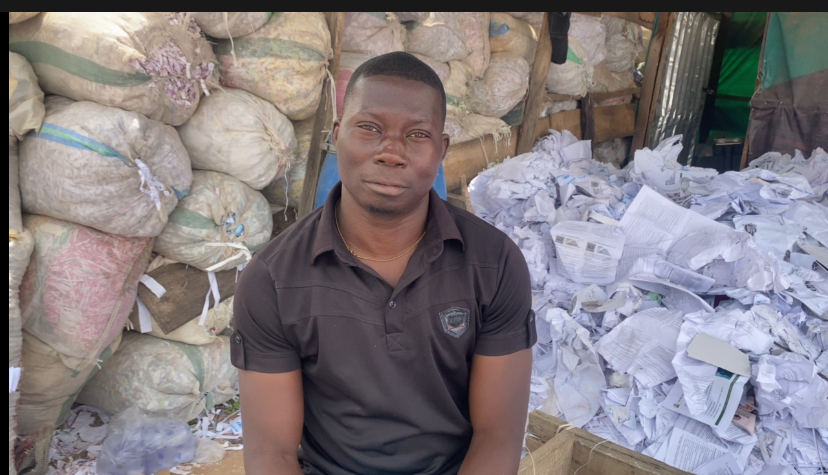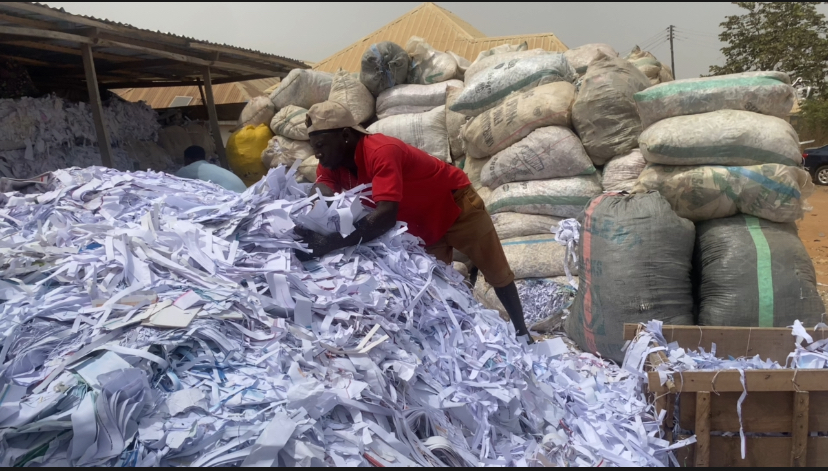It’s a Monday morning, and five workers sift through a towering pile of paper at the edge of a compound, their movements in sync with upbeat music blaring from a loudspeaker behind them.
Nearby, a man in a black t-shirt watches attentively, occasionally directing the team and pausing to wave at curious passersby peeking into the bustling recycling plant in Abuja’s Chika Community.
“Instead of burning papers, we recycle,” says the man, introducing himself as Ede Joseph Emeka.
Emeka runs Joebliss Enterprise, a company that purchases and processes paper waste, transforming discarded materials into resources ready for recycling. “Every ton of paper we save is one less ton contributing to pollution,” he says, explaining that his company buys paper waste from households, businesses, and collection agents, diverting it from landfills and incinerators.
In a country struggling with poor waste management practices, Emeka’s work is more than just a business—it’s a mission. Paper accounts for 25% of landfill waste and 33% of municipal waste globally, according to Paper Waste Facts. When left to decompose, it emits methane gas, which is 25 times more toxic than carbon dioxide. Nigeria is among the 30 worst countries globally for waste management, as reported by the Yale Center for Environmental Law and Policy, due to poor solid waste control, low recycling rates, and high ocean plastic pollution.
By collecting and preparing paper for recycling, Joebliss Enterprise not only reduces greenhouse gas emissions but also promotes sustainable resource use, helping to mitigate these environmental challenges. “It’s not just about cleaning up today’s mess,” Emeka adds. “It’s about securing a better future.”
From survival to sustainability
Emeka’s journey into recycling wasn’t planned—it was born out of necessity. After completing his secondary school education at Ebonyi State in 2013, he moved to Abuja in search of a white-collar job. “I thought Abuja would be the land of opportunities,” he recalls. “But the reality was different. Unemployment was high, and I had no connections.”
Faced with limited options, Emeka considered returning home but decided to stay when he met Okoro Uchenna Henry, an experienced recycler who introduced him to the world of paper recycling. “Henry showed me how paper waste could be turned into something valuable,” Emeka says. “It wasn’t glamorous, but it made sense.”
Under Henry’s mentorship, Emeka learned the fundamentals of the trade—building supplier relationships, negotiating with buyers, and understanding the logistics of waste collection.
By July 2023, armed with years of experience, Emeka launched Joebliss Enterprise with support from two partners: Patience Sunday, a Lagos-based agent who provided capital, and another silent partner who helped secure the Chika Community location in Abuja.
Today, Joebliss Enterprise employs 10 workers, paid weekly, who help process tons of paper waste daily. For Emeka, this venture is about more than profit. “Paper may be biodegradable, but when dumped in large quantities, it creates an environmental hazard,” he explains. “Recycling is not just a business for me—it’s a way to give back to the community and protect our planet.”

A little bit more
Recycling one tonne of paper saves approximately 17 trees, 1,400 liters of oil, and 26,500 liters of water, according to global estimates. Joebliss Enterprise contributes significantly to this effort, sending paper waste to recycling plants in Lagos, Enugu, Onitsha, Port Harcourt, and Ogun State, where they are turned into products like tissue paper and serviettes. Additionally, non-recyclable items like newspapers, cartons, and juice boxes are sent to Kano State to be processed into mosquito coils.
“Our reach goes beyond Abuja,” Emeka notes. “We buy from across Nigeria, ensuring that even remote areas contribute to this effort.”
Emeka’s passion for recycling extends beyond profits. Earlier this year, two schools visited his site for an excursion. Students learned about the recycling process and the environmental benefits of reducing waste. “It’s not just a business; it’s an opportunity to educate the next generation,” he says.
One of his workers, Ede Chikezie Ezekiel, shares similar sentiments. As an environmental chemist, he finds fulfillment in the job. “This aligns with the Sustainable Development Goals,” Ezekiel says. “When I joined the industry in 2010, I didn’t realize how much impact recycling could have. Now, I even lead the non-financial arm of the paper recycling community in the FCT.”
Despite its successes, Joebliss Enterprise faces significant obstacles. Finance is a constant struggle, as large deposits are required to secure paper from suppliers, and collections are sporadic, sometimes taking a month to gather enough for processing. The lack of modern equipment also hampers efficiency. “We manually sort and bundle everything,” Emeka explains. “Machines could compress a tonne of paper in no time, but they’re expensive, and we lack the capital.”
Safety is another concern. Workers lack basic protective gear like gloves and boots, increasing their risk of injury. The site’s poor structure and the condition of access roads add to the challenges. Trucks often struggle to reach the plant, forcing them to take longer, costlier routes.
But Emeka Recognizes the importance of a conducive working environment for his employees and intends to establish a better structure to protect papers from damage caused by rainfall.
Still, Emeka remains optimistic. “Every recycled sheet of paper is a small victory for the environment,” he says. “With more support, we can scale up and make an even greater impact.”
This story was produced with the support of Nigeria Health Watch through the Solutions Journalism Network, a nonprofit organisation dedicated to rigorous and compelling reporting about responses to social problems.
Ede Joseph Emeka, founder of Joebliss Enterprise in Abuja, is tackling Nigeria's waste management challenges by recycling paper, which accounts for a significant portion of waste and emits harmful methane gas when decomposed. His enterprise buys paper waste from various sources and processes it, diverting it from pollution-contributing landfills. Joebliss Enterprise employs ten workers and sends processed paper across Nigeria to be recycled into products like tissue paper and mosquito coils.
Emeka's journey began in 2013 when he moved to Abuja to seek employment but pivoted to recycling under the mentorship of an experienced recycler, Henry, due to limited job opportunities. Established in July 2023 with the help of partners, Joebliss Enterprise is driven by the mission of resource sustainability and environmental protection, rather than mere profit.
Despite its environmental impact, the enterprise faces financial hurdles and lacks modern equipment and proper worker safety gear, which hampers efficiency. However, Emeka is optimistic about scaling their efforts, emphasizing that even small recycling contributions positively impact the environment. He is committed to creating a better working environment and infrastructure that aligns with sustainable development goals, advocating for increased support to expand their efforts.






